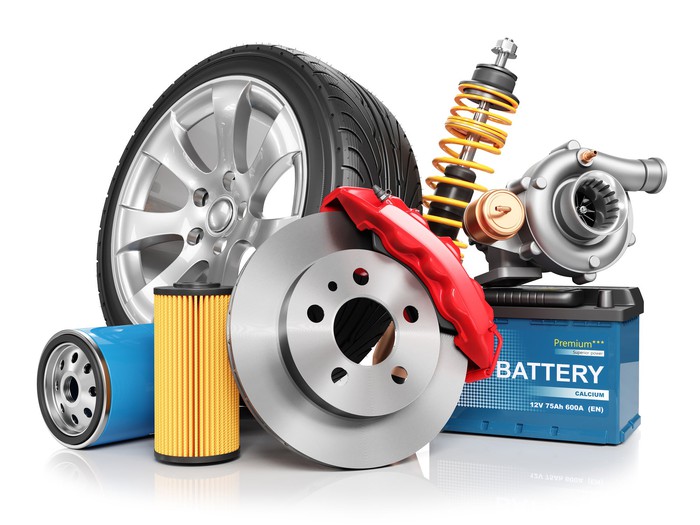Auto parts retailer AutoZone (NYSE: AZO) ended its fiscal 2020 year in a high performance “zone” as its fourth-quarter results, issued Tuesday, attested. AutoZone’s net sales increased by 14% year over year to $4.5 billion. However, when accounting for an extra week in the fiscal fourth quarter of 2019, AutoZone’s adjusted sales actually rose 21%.
The company’s same-store sales soared by nearly 22% over the comparable period, driven by a 24% jump in retail do-it-yourself (DIY) business. According to CEO Bill Rhodes, this was the largest same-store sales leap in the company’s history. AutoZone’s commercial segment, which supplies parts to body shops, auto mechanics, and other auto-related entities, also generated an appreciable 17% rise in year-over-year sales.
Part of AutoZone’s success this quarter was due to its management of inventory mix; that is, keeping an assortment of in-demand items on the shelves for retail DIY customers. This strategy necessarily favored lower-margin items over bigger-ticket parts, and gross margin dipped 30 basis points to 53.1% against the prior-year quarter. However, the organization managed to keep its operating expenses flat against the comparable period, so the revenue increase impacted profits quite favorably. Operating income rose roughly 30% to $1 billion, and net income advanced by 31% to $740 million.
AutoZone’s execution against strategic objectives was impressive beyond its financial performance this quarter. Despite the constraints of the coronavirus pandemic, the company opened 49 new domestic stores, 11 in Mexico and five in Brazil, for a total net addition of 65 stores globally during the last three months. The additions bring AutoZone’s total store count to 6,549.
Of course, the quarter’s outsize numbers weren’t problem-free. Rhodes mentioned on the company’s earnings conference call that store inventories are currently at sub-optimal in-stock levels, but this is to be expected as AutoZone’s supply chain has been operating at 25% excess capacity in recent weeks to fill demand.
Another cautionary sign over the last three months was the curtailment of federal government unemployment benefits nationwide — these expired two-thirds of the way through the quarter. As expected, this diminished some of AutoZone’s sales momentum, yet same-store sales still increased at a year-over-year rate of 16.5% in August.
Looking forward
Can AutoZone continue its high-octane performance in the next few quarters? Rhodes allowed that it would be difficult to extrapolate this period’s results to the coming months. But during the earnings call, he did point out some tailwinds the company is enjoying. Certainly, a segment of the population driving fewer miles as remote work flourishes has helped to spur DIY car improvement and maintenance projects. But AutoZone’s core customers, who tend to be lower-income workers tied to the service economy, are still driving to work each day. So the company appears to be benefiting from stable core demand as much as it is a surge in DIY sales.
Though the organization didn’t provide forward earnings estimates in its report, there are subtle signs that management expects beneficial conditions for the next few quarters. AutoZone is typically a frequent purchaser of its own shares on the open market (it’s repurchased $22 billion worth of common stock cumulatively since 1998), but it halted share buybacks in March out of caution due to the pandemic. Thus, the company repurchased zero shares in the final quarter of the fiscal year. Management refrained from any buyback activity even as the organization generated a record $1.4 billion in operating cash flow during the quarter.
However, looking forward to the new fiscal year, management signaled that AutoZone will start up its buyback program next quarter. CFO Bill Giles stated that the retailer would again begin to use its generous free cash flow to opportunistically reduce share count. This was the clearest sign offered that while management is hesitant to discuss sales levels in the year ahead as COVID-19 continues to loom over the economy, it clearly has confidence in vigorous revenue expansion ahead. Investors within an uncertain stock market appeared to hold just a bit less confidence after absorbing this quarter’s scorecard: AutoZone stock lost 1.5% in yesterday’s trading session, and shares are down roughly 2% year to date.

